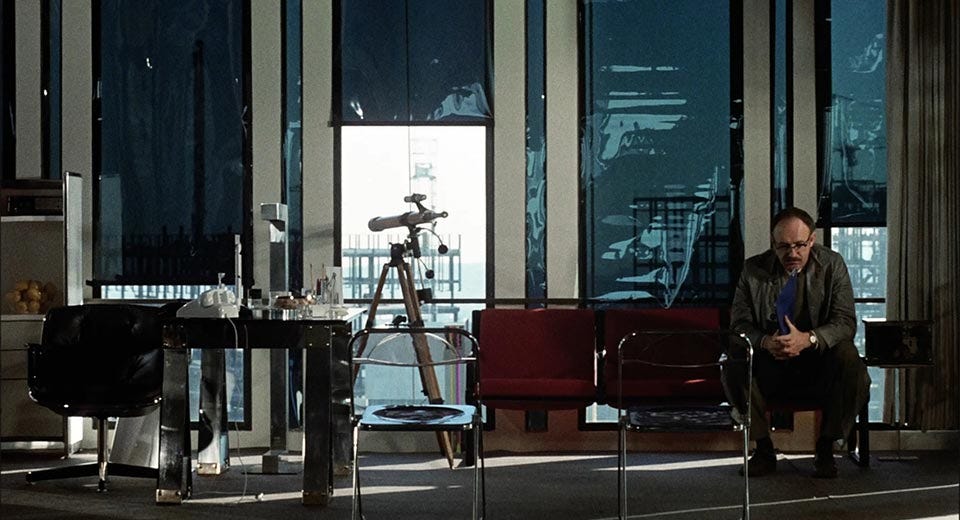The Conversation
San Francisco's bleeding soul
The information presented at the end of the film will hit everyone differently, but hit it will. The earliest indication of sinister forces (assuming you consider espionage de rigueur) in the film comes in the form of a handsome, young, and sneering Harrison Ford, who is somewhat robbed of his menace by the unfortunate fact of his heroic fame over the subsequent decades. Gene Hackman’s Harry Caul, on the other side of the office, doesn’t work very hard these days, though he knows the stakes of his profession, given his meticulous paranoia. Through sheer stubbornness and ladder-climbing he encounters a situation that makes him step his game up, proving that spite is one of the strongest emotions known to man.
The Conversation (1974), Francis Ford Coppola’s masterpiece between masterpieces (preceded by The Godfather (1973) and followed by The Godfather: Part II (1974)) is a San Francisco movie for the ages. Truly. In a town where data and information are the latest gold being rushed after, The Conversation gives us a preview of old-school data mining. In one sequence of the film, we see a shockingly casual convention of wiretappers, er, surveillance and security technicians. The palpable danger and mystery of 70s San Francisco gets a swansong in Coppola’s film given how far we’ve come since Sam Spade prowled the streets looking for answers.
The film opens on Union Square, which younger SF locals might not readily recognize. Nowadays a stroll through Union Square is a stroll through one of the only neighborhoods in San Francisco with a heavy police presence. (This is not an endorsement of police presence, just an observation. Rolex and Cartier are well looked after in SF. Homeless people not so much.) In The Conversation, the square almost resembles a French public garden, rather than the concrete plaza it is today. One of the first lines of the film is one of the two central characters commenting on a homeless park bench sleeper.
It’s somewhat shocking how prescient The Conversation feels today. Even a cursory read of American history in the 70s provides plenty of culprits for the pervasive feeling of societal decay that the film exudes, told through the story of Harry Caul: JFK’s assassination 10 years prior, RFK and MLK’s assassination 5 years prior, Watergate 2 years prior, Vietnam winding down in national disgrace. The Olympic disaster in Munich. The list goes on. But it’s almost as if Coppola could see the insidious ouija board with a million hands on it leading to these awful outcomes: The machinery draining society of its soul. As one character in the film points out, in true San Francisco fashion, when Harry is agonizing over what he’s hearing on his unethically procured tape:
“The job. You’re not supposed to feel anything about it. You’re just supposed to do it.”
The Conversation
Written and Directed by Francis Ford Coppola
1974
113 minutes
English
Recommended way to watch (at time of publication): Sadly this one isn’t free, but it’s worth the price of admission: Rent it for ~$4 on Google or Apple Services.

